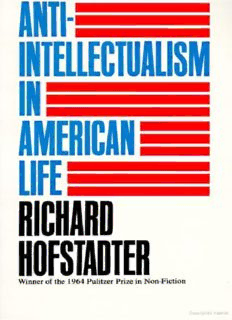
Anti-Intellectualism in American Life PDF
Preview Anti-Intellectualism in American Life
OTHER BOOKS BY Richard Hofstadter American Higher Education: A Documentary History (with wilson smith) (1961) The American Republic (with daniel aaron and william miller) (1959) Great Issues in American History (1958) The United States ( ) (1957) WITH DANIEL AARON AND WILLIAM MILLER The Age of Reform (1955) The Development of Academic Freedom in the United States (with walter p. metzger) (1955) The Development and Scope of Higher Education in the United States (with c. dewitt hardy) (1952) The American Political Tradition (1948) Social Darwinism in American Thought (1944) Anti-intellectualism IN AMERICAN LIFE BY RICHARD HOFSTADTER NEW YORK ALFRED A. KNOPF 1 9 6 3 NEW YORK ALFRED A. KNOPF 1963 L. C. catalog card number: 6314086 THIS IS A BORZOI BOOK PUBLISHED BY ALFRED A. KNOPF, INC. Copyright © 1962, 1963 by RICHARD HOFSTADTER. All rights reserved. No part of this book may be reproduced in any form without permission in writing from the publisher, except by a reviewer, who may quote brief passages in a review to be printed in a magazine or newspaper. Manufactured in the United States of America, and distributed by Random House, Inc. Published simultaneously in Toronto, Canada, by Random House of Canada, Limited FIRST EDITION Chapter 7 appeared in somewhat different form as “‛Idealists and Professors and Sore-heads’: The Genteel Reformers” in the Columbia University Forum. Chapter 14 appeared in somewhat different form as “The Child and the World” in Daedalus. TO E. A. H. 1888-1962 FOREWORD ^ T A intellectual has usually been regarded with considerable suspicion HE MERICAN or resentment by his countrymen, and in our own times the old matter-of-fact designation of him as the “highbrow” has been succeeded by the more derisive “egghead”. In this stimulating book, a Pulitzer Prize-winning historian uses the idea of anti-intellectualism as a device for looking at several of the less attractive aspects of American life. This is not a formal history of a single idea, but rather an extended personal essay which explores various features of the American character. Mr. Hofstadter deals, in turn, with the peculiarly dismal anti-intellectual climate of the 1950’s; with the evangelical religious movements from the Great Awakening to Billy Graham; with the decline of the educated gentleman in American politics before the era of “the expert”; with the insistent ideal of practicality among American businessmen; and with anti-intellectualism in education—the absurdities of life- adjustment theory and the uses and misuses of John Dewey. His concern is not merely to portray the scorners of intellect in American life, but to say something about what the intellectual is, and can be, as a force in a democratic society. PREFATORY NOTE ^ W ordinarily done in prefaces I have tried to do in my first two chapters, HAT IS which explain the origin and the intent of this book, as well as its central terms. But one thing should be particularly clear at the beginning: what I have done is merely to use the idea of anti-intellectualism as a device for looking at various aspects, hardly the most appealing, of American society and culture. Despite the fringes of documentation on many of its pages, this work is by no means a formal history but largely a personal book, whose factual details are organized and dominated by my views. The theme itself has been developed in a manner that is by choice rather impulsive and by necessity only fragmentary. If one is to look at a society like ours from its nether end, so to speak, through scores of consecutive pages, one must resolve to risk wounding the national amour-propre, although this can only divert attention from the business at hand, which is to shed a little light on our cultural problems. One must resolve still more firmly to run some slight risk of encouraging the canting and self- righteous anti-Americanism that in Europe today so commonly masquerades as well-informed criticism of this country. For all their bragging and their hypersensitivity, Americans are, if not the most self-critical, at least the most anxiously self-conscious people in the world, forever concerned about the inadequacy of something or other their national morality, their national culture, their national purpose. This very uncertainty has given their intellectuals a critical function of special interest. The appropriation of some of this self- criticism by foreign ideologues for purposes that go beyond its original scope or intention is an inevitable hazard. But the possibility that a sound enterprise in self-correction may be overheard and misused is the poorest of reasons for suspending it. On this count I admire the spirit of Emerson, who wrote: ‟Let us honestly state the facts. Our America has a bad name for superficialness. Great men, great nations, have not been boasters and buffoons, but perceivers of the terror of life, and have manned themselves to face it.” —R.H.
